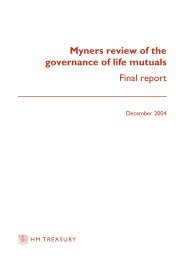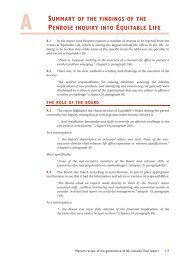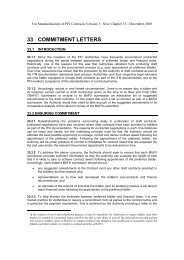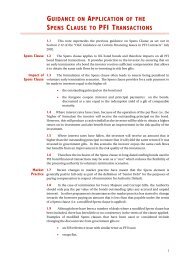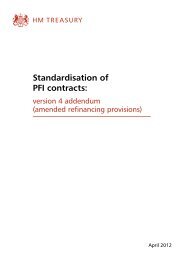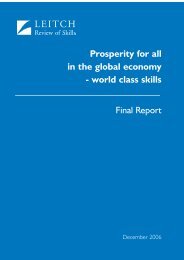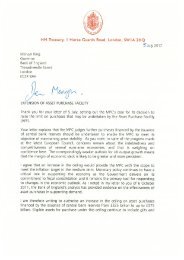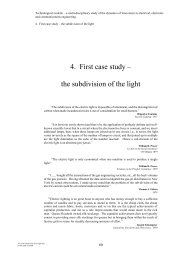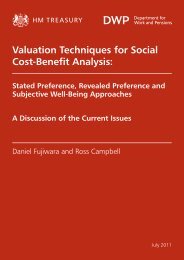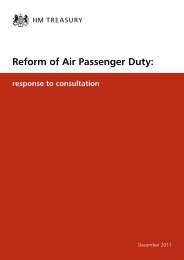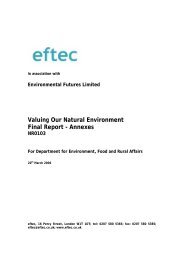NAO Good Practice Guide - Tackling external fraud - HM Treasury
NAO Good Practice Guide - Tackling external fraud - HM Treasury
NAO Good Practice Guide - Tackling external fraud - HM Treasury
Create successful ePaper yourself
Turn your PDF publications into a flip-book with our unique Google optimized e-Paper software.
4 <strong>Good</strong> practice in tackling <strong>external</strong> <strong>fraud</strong> | Detecting and investigating <strong>external</strong> <strong>fraud</strong> and imposing sanctions<br />
3.19 Departments also need to look at whether<br />
the total number of investigations is commensurate<br />
with the potential sums lost from <strong>fraud</strong>. The costs<br />
of investigating cases can be resource intensive.<br />
Assessing the financial return achieved on the<br />
overall caseload, and different categories of case<br />
will indicate the likely benefits of undertaking more<br />
investigations or a different mix.<br />
Figure 29<br />
The Department for Work and Pensions has a dedicated<br />
intelligence function to evaluate cases of potential <strong>fraud</strong><br />
and decide which to investigate<br />
The Department for Work and<br />
Pensions has a network of 10<br />
Operational Intelligence Units<br />
located across England, Scotland<br />
and Wales. When referrals are<br />
received for investigation the<br />
Fraud Referral and Intervention<br />
Management System (FRAIMS)<br />
applies a rules engine that<br />
determines routes for investigation<br />
and provides a Gateway through<br />
which cases can be channelled.<br />
This clarifies whether cases should<br />
be investigated via the Fraud<br />
Investigation Service or Customer<br />
Compliance route (see Figure 14).<br />
For <strong>fraud</strong> investigation cases, the<br />
Operational Intelligence Units then<br />
gather and evaluate intelligence on<br />
cases to assist <strong>fraud</strong> investigators,<br />
including exchanging information<br />
with other agencies where<br />
appropriate.<br />
Figure 30<br />
<strong>HM</strong> Revenue & Customs uses criteria for deciding which<br />
cases to refer for criminal investigation<br />
<strong>HM</strong> Revenue & Customs has a published policy setting out the types of<br />
behaviour it will usually consider for criminal investigation. These include<br />
factors such as whether the <strong>fraud</strong> is an attack on the system, the type of<br />
person carrying out the <strong>fraud</strong> and previous behaviour. The objective of the<br />
criteria is to ensure that resources can be targeted where they have the<br />
greatest effect on compliance. Whenever a case is referred for possible<br />
criminal investigation <strong>HM</strong> Revenue & Customs evaluate it against these<br />
criteria, as well as considering the strength of available evidence and<br />
likelihood of a successful investigation.<br />
3.20 Tracking the progress of <strong>fraud</strong> investigations<br />
allows managers to assess the overall workload<br />
(such as whether investigations are concentrated<br />
on the main types of <strong>fraud</strong> set out in the<br />
Department’s strategy); identify problem areas<br />
such as where progress is slower than would be<br />
expected; understand the cost implications of<br />
investigations and the effects on planning future<br />
resource usage or the consequences of increasing<br />
or decreasing resource levels (Figure 31).<br />
Figure 31<br />
Information to help managers track <strong>fraud</strong><br />
investigations<br />
Useful information can include:<br />
l number of investigations carried out;<br />
l value of <strong>fraud</strong> loss identified;<br />
l duration of individual investigations;<br />
l costs of individual investigations;<br />
l methods of investigations used;<br />
l outcome of investigations (prosecutions; fines etc).<br />
3.21 Where departments investigate <strong>fraud</strong>s they<br />
will need to consider whether there are sufficient<br />
staff with the right technical and investigative<br />
knowledge and experience. The Counter Fraud<br />
Professional Accreditation Board was set up in<br />
00 as a professional body for counter <strong>fraud</strong><br />
specialists. It sets professional conduct guidelines<br />
for its members who have successfully completed<br />
the specialist counter <strong>fraud</strong> training and university<br />
courses. Figure 32 sets out the development of<br />
a professional and ethical approach to countering<br />
<strong>fraud</strong> by the NHS Counter Fraud Service.



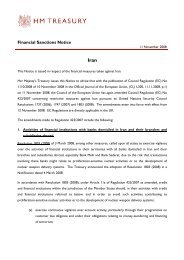
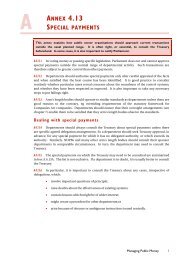
![AIRTO [Professor Dr Brian Blunden] - HM Treasury](https://img.yumpu.com/15492848/1/184x260/airto-professor-dr-brian-blunden-hm-treasury.jpg?quality=85)
